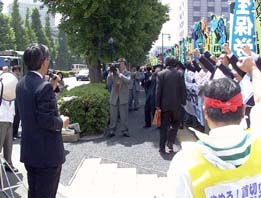| Toward Nursing System Unification and Medical Care System Reform Opening the 21st Century Central Rally on Medical Care and Nursing (14 May 1999) |
|
Photo: Vice President Morooka submitted a request.
Secretary General Sasamori, representing the organizers, addressed the participants stating "Neither unification of the nursing system nor reform of the medical care system has advanced due in large part to political pressure from the Japan Medical Association. Let us all be one and move government." |
 May
12 was "Nursing Day" and RENGO held the "Opening the
21st Century Central Rally on Medical Care and Nursing" at the
Hibiya Public Hall in Tokyo. Approximately 1,500 people gathered together,
representing workers from mostly the medical and nursing care professions.
May
12 was "Nursing Day" and RENGO held the "Opening the
21st Century Central Rally on Medical Care and Nursing" at the
Hibiya Public Hall in Tokyo. Approximately 1,500 people gathered together,
representing workers from mostly the medical and nursing care professions. The
Employment Security Bill and the Dispatched Labor Law Amendment Bill
are now under deliberation in the Labor Committee in the House of Representatives.
The Government's Amendment Bill aims at the provisional liberalization
of new dispatchment services. RENGO is concerned that if the bill passes,
employment insecurity would increase due to the substitution of conventional
employment, thereby deteriorating working conditions for workers overall.
The
Employment Security Bill and the Dispatched Labor Law Amendment Bill
are now under deliberation in the Labor Committee in the House of Representatives.
The Government's Amendment Bill aims at the provisional liberalization
of new dispatchment services. RENGO is concerned that if the bill passes,
employment insecurity would increase due to the substitution of conventional
employment, thereby deteriorating working conditions for workers overall.